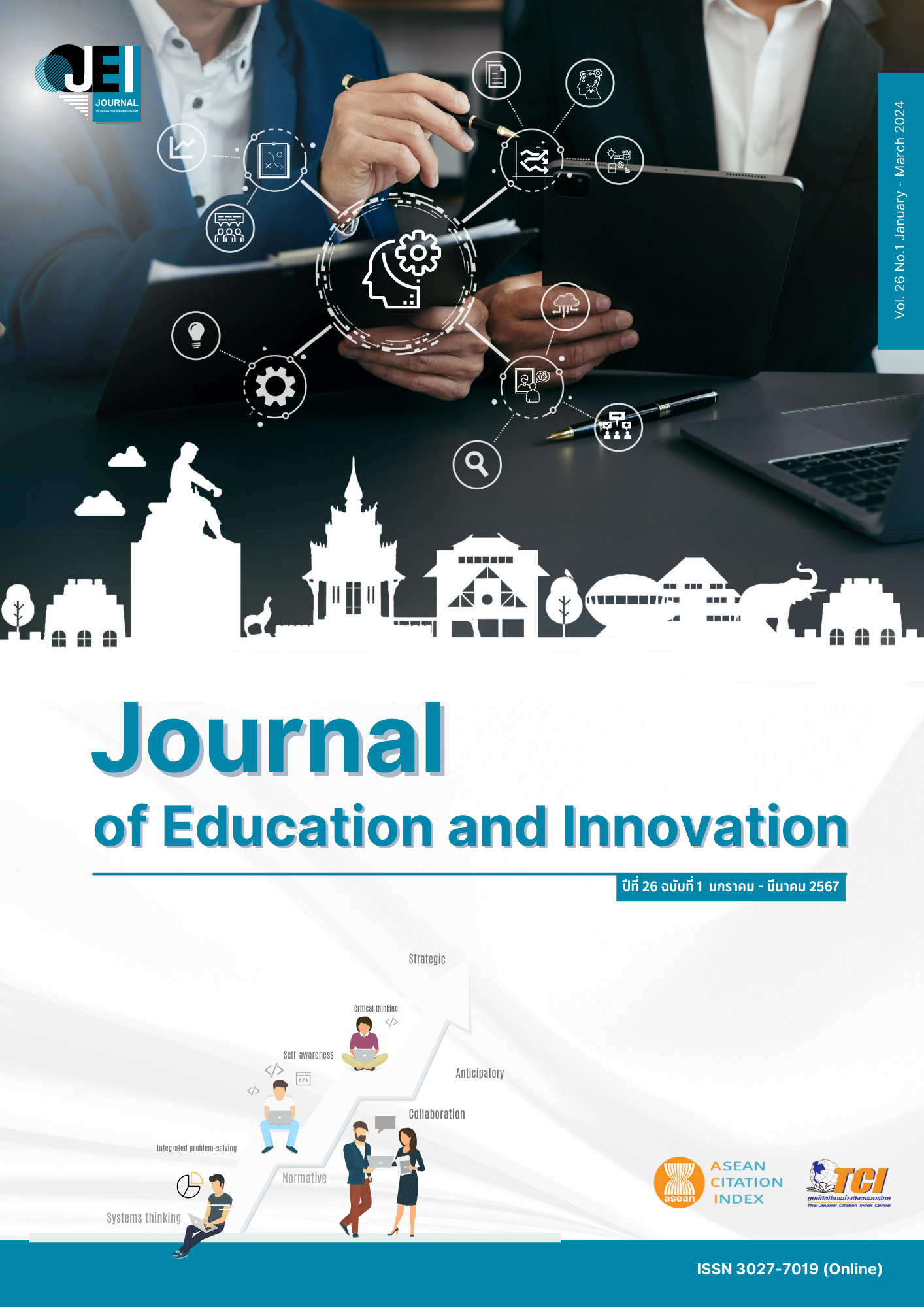THE DEVELOPMENT OF BLENDED TRAINING MODEL WITH PROFESSIONAL LEARNING COMMUNITY TO ENHANCE LEARNING MANAGEMENT COMPETENCY USING COMMUNICATION LEARNING TECHNIQUE WITH INFORMATION TECHNOLOGY COMMUNICATION FOR ENGLISH TEACHER IN PRIVATE SCHOOL
Main Article Content
Abstract
The purposes of this research were (1) to study the need for Blended Training model with Professional Learning Community (BTPLC Model) to enhance Learning Management Competency using Communication Learning Technique (CLT) with Information Technology Communication (ITC) for English Teachers in Private School, (2) to study competency criterion for language learning management competency for communication with ITC, (3) to develop and verify the quality of BTPLC model, and (4) to study the results of using the with Professional Learning Community to enhance Learning Management Competency. The sample consisted of 30 primary school teachers in Kamphaeng Phet Province by cluster random sampling. The research instruments were 1) the needs of BTPLC Model questionnaire, 2) the assessment form for the appropriateness of learning management competency criterion, 3) BTPLC Model and manual, 4) the appropriate assessment form for BTPLC Model, 5) knowledge competency test before and after training and the evaluation form for language learning management skills for communication, 6) the assessment of the learning management competency using CLT with ITC, 7) Observation form of learning management competency using communication learning technique with ITC, and 8) Satisfaction form of BTPLC. Data were analyzed by using percentage, mean, and standard deviation and t-test dependent. The results of research were as follows:
1. Teachers needed BTPLC model at high level ( = 4.25, S.D. =0.78).
2. The learning management competency using CLT with ITC competency revealed that the knowledge competency had 5 indicators and skill competency had 7 indicators.
3. The appropriable components of BTPLC model consisted of 7 components as follows: training model principles, objectives, trainers/trainees, training content, Blended training process with the professional learning community, suitability media and facilities and learning management competency using communication learning technique with information technology communication. The model was evaluated by experts, it was found that all components were appropriate at the highest level ( = 4.78, SD = 0.42). When analyzing the efficiency of the training model, it was found that the value was 81.80/82.67 which is higher than the specified criterion.
4. The results of using the BTPLC model found that 4.1) Teachers enhance the knowledge of learning management competency using CLT with ITC after training were statistically significant higher than post-test at the .05; 4.2) Teachers enhance the skill of learning management competency using CLT with ITC, the assessment of skill competency had the highest quality level ( = 4.71, SD = 0.52); 4.3) Teachers enhance the learning management competency using CLT with ITC in practicing in the classroom, it was found that teachers had the highest level of teaching quality (
= 4.85, SD = 0.37); and 4.4) There were satisfied with blended training model with PLC at the highest level (
= 4.63, SD = 0.51).
Article Details

This work is licensed under a Creative Commons Attribution-NonCommercial-NoDerivatives 4.0 International License.
The owner of the article does not copy or violate any of its copyright. If any copyright infringement occurs or prosecution, in any case, the Editorial Board is not involved in all the rights to the owner of the article to be performed.
References
Anosri, L. (2014). The development of blended training. Retrieved on June 10, 2019, from https://www.gotoknow.org/posts/225358
Bersin and Associates. (2003). Blended learning: What works?: An industry study of the strategy, implementation, and impact of blended learning. Retrieved from http://www.learningcircuits.org/2003/jul2003/bersin.htm
Bootchuy, T., & Bootchuy, P. (2021). Blended learning design in communicative English language teaching for learners in higher education in the digital age. Journal of Educational Technology, 16(20), 74-91.
Bureau of Personal Competency Development. (2010). Handbook of teacher’s competency (revised edition). Bangkok: Office of the Basic Education Commission.
Chaichaowarat, R. (2015). Process for enhancing Pre-Service Teachers’ ability in designing instruction on professional learning community approach: A case study research. Bangkok: Faculty of Education, Chulalongkorn University.
Department of Curriculum and Instruction Development. (2008). Basic Education Core Curriculum B.E.2551 (A.D. 2008). Bangkok: Ministry of Education.
Dufour, R., Dufour, R., Eaker, R., & Many, T. (2006). Learning by doing: A handbook for professional learning communities at work. Bloomington, IN: National Education Service.
Istrate, O. (2013). A blended learning delivery model to train medical staff. Social and Behavioral Sciences, 76(0), 403-407.
Jakchum, C. (2016). The development of a training program based on blended learning for enhancing teacher’s competency on using information and communication technology in learning management. Journal of Yala Rajabhat University, 11(2), 129-143.
Kedthawon, P. (2022). Development of Training courses based on Blended Learning Concepts to empower teachers for Century 21st. Journal of MCU Ubon Review, 7(2), 1347-1355.
Ministry of Education. (2017). Thailand Education Scheme B.E. 2560-2579. Bangkok: Ministry of Education.
Mitchell, C., & Sackney, L. (2000). Profound improvement: building capacity for a learning community. Lisse: Swets & Zeitlinger.
Office of the Basic Education Commission. (2014). Manual for teacher potential development and education supervision Evaluation in the classroom to diagnose learner deficiencies. Bangkok: Bureau of Educational Testing, Office of the Basic Education Commission, Ministry of Education.
Pantho, W. (2018). The development of blended training systems with action learning to enhance competency in instruction design on project based learning via integrate information and communication technology for primary school teachers (Doctoral dissertation). Pitsanulok: Nareasuan University.
Poldongnok, C. (2012). The development of coaching online training system for the service officer to technology user, commercial bank (Master thesis). Bangkok: Silpakorn University.


